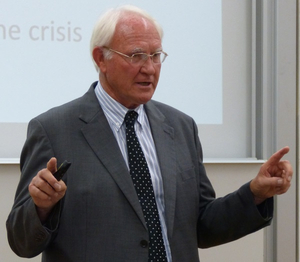 On 14 June 2016, Michael R. Wickens, Professor of Economics at the University of York, gave a SAFE Policy Lecture entitled “Is there an alternative way to avoid another eurozone crisis to the Five Presidents' Report?” He was invited and introduced by Hans-Helmut Kotz, SAFE Policy Center.
On 14 June 2016, Michael R. Wickens, Professor of Economics at the University of York, gave a SAFE Policy Lecture entitled “Is there an alternative way to avoid another eurozone crisis to the Five Presidents' Report?” He was invited and introduced by Hans-Helmut Kotz, SAFE Policy Center.
The European Monetary Union, which had been designed to promote economic growth, price stability, full employment and political integration is, as Wickens held, not a success story. He believes that the Five Presidents’ Report on the completion of the Economic and Monetary Union (EMU), which was published in June 2015 by the Presidents of the European Commission, the Euro Summit, the Eurogroup, the European Central Bank and the European Parliament, in fact solely aims at making the single currency sustainable. In his view, the report can be interpreted as an attempt to overcome the shortcomings of the Maastricht Treaty. For this purpose, it suggests to achieve much closer political integration until 2025 with the creation of a banking union, a capital markets union as well as a fiscal union.
Instead of these far-reaching proposals, Wickens suggests to rather trust financial markets and empower them to price risks appropriately. This would help avoiding future crises much more effectively than any additional centralization. In Wickens’ view, the “one-size-fits-all” monetary policy had contributed to the eurozone crisis. The interest rates, being too low for high inflation countries, invited these to accumulate too much private and/or sovereign debt which, ultimately, lay at the roots of their banking and/or fiscal crises. He gave examples to what extent financial markets failed to identify the crisis, or the risks that were building up before it, and therefore continued to lend to the European crisis countries at low interest rates.
The ECB, with its pursuit of a highly expansionary monetary policy, is trying to restore the rate of eurozone inflation to its pre-crisis level. This is, as Wickens holds, a dangerous mistake as it is propping up sovereign debt and leading the ECB away from its original aim: to be the lender-of-last-resort to the banking system. Despite of all its unconventional efforts, the borrowing rates were, in fact, even lower than before the crisis. Any pricing discipline provided by financial markets were offset by the squeeze of interest rates pursued by the ECB and, in this sense, the efforts for crisis prevention could be interpreted as being counterproductive. In Wickens’ view, the three unions, once in place, could make a euro-wide recession even more difficult to handle, as the eurozone countries would have lost their fiscal policy instruments in addition to the monetary ones.

